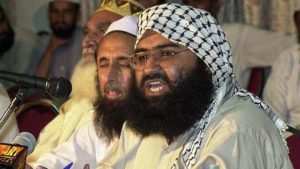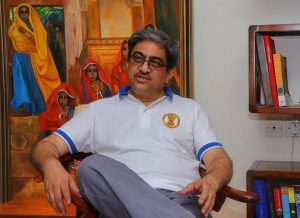New York, March 13 (AFP): In a note sent to the UN Security Council on Wednesday, China said it needed more time to examine the sanctions request targeting Masood Azhar, diplomats said.
China has twice blocked — in 2016 and 2017 — attempts to impose sanctions on the JeM leader. The group itself was added to the terror list in 2001.
India and Pakistan carried out air raids last month across their disputed Kashmir frontier in clashes that sent tensions soaring between the nuclear-armed countries.
China calls for ‘responsible discussions’ ahead of UNSC meet on JeM
India on February 26 claimed staging an air raid on a camp inside Pakistan that it said belonged to JeM. One day later Pakistan downed two Indian fighter jets along the Line of Control (LoC).
A pilot who was shot down over Pakistani territory was later sent back to India as a goodwill gesture.

Islamabad announced last week that more than 100 militants, including many from JeM, had been detained, but India has greeted those statements with suspicion.
On Tuesday, China had said that ‘responsible and serious discussions’ are needed ahead of the United Nations Security Council (UNSC)’s sanctions committee meeting.
During his weekly briefing, China’s Foreign Ministry spokesperson Lu Kang responded to a question which asked what Beijing’s position would be at the meet after India on Saturday appealed that all permanent members of UNSC should declare Azhar a terrorist.
“We already stressed China’s position on the listing of terrorist organizations and individuals in the UN Security Council 1267 Committee on many occasions. China has all along participated in relevant discussions in a responsible manner and in strict accordance with the rules of procedure and provisions of the 1267 committee.”
“China will continue to communicate and work with relevant parties in a responsible manner so as to properly resolve this matter. Only by making a decision through responsible and serious discussions can we find a lasting solution,” Kang said.

Former Indian Ambassador in China, Gautam Bambawale explains China’s attitude in an interview to The Hindu.
China has said in the past that it doesn’t have enough information to list Azhar, despite the fact that on each occasion we have provided more information of his links to terror attacks. I think we must keep trying as we have, and this time we are very close to having Azhar on the list. The truth is, China does take Pakistan’s interests into account, and that is the reason it has been hesitant to allow the listing. But this time the momentum is with us. I would also like to say that we must learn to be transactional with China, and see what it is that Beijing would like in return for support at the UN.
But China’s objections are not insurmountable. Remember, we were able to bring China around to placing Pakistan on the FATF’s ‘grey list’ by being transactional about it.
On this particular issue, at this particular time, we and other countries have not been able to convince China that this is in their best interest. But that doesn’t mean we should stop trying.
China has a very strong relationship with Pakistan, as it has had for decades: on strategic issues, their military relationship, and on economic issues. Even so, where terror is concerned, China is very clear about where its interests lie, and particularly given concerns over groups in Xinjiang, an area that connects it to Pakistan. So India’s approach must be to work slowly on China to align itself on terror with our concerns, and then for it to move Pakistan in the direction we want it to go.
I think we must realize the multi-faceted relationship that we have with China. We have problems, but we have also been able to make great strides in ties, particularly when we take our emotions out of the relationship and focus on our interests. With Pakistan, it is difficult to take the emotions out after we are hit with one terror attack after another. Still, I must say here that I believe it is necessary to separate some things. For example, I would advocate that we don’t boycott the ICC World Cup simply because we don’t want to play Pakistan, given that we have a good chance of winning. In such issues, it is best not to mix emotions and policy. We must find a way to tackle terrorism, to tackle our problems, but without mixing emotions in them. It is only when we think through the situation in a cool-headed manner that our responses will be most effective with Pakistan.




























































